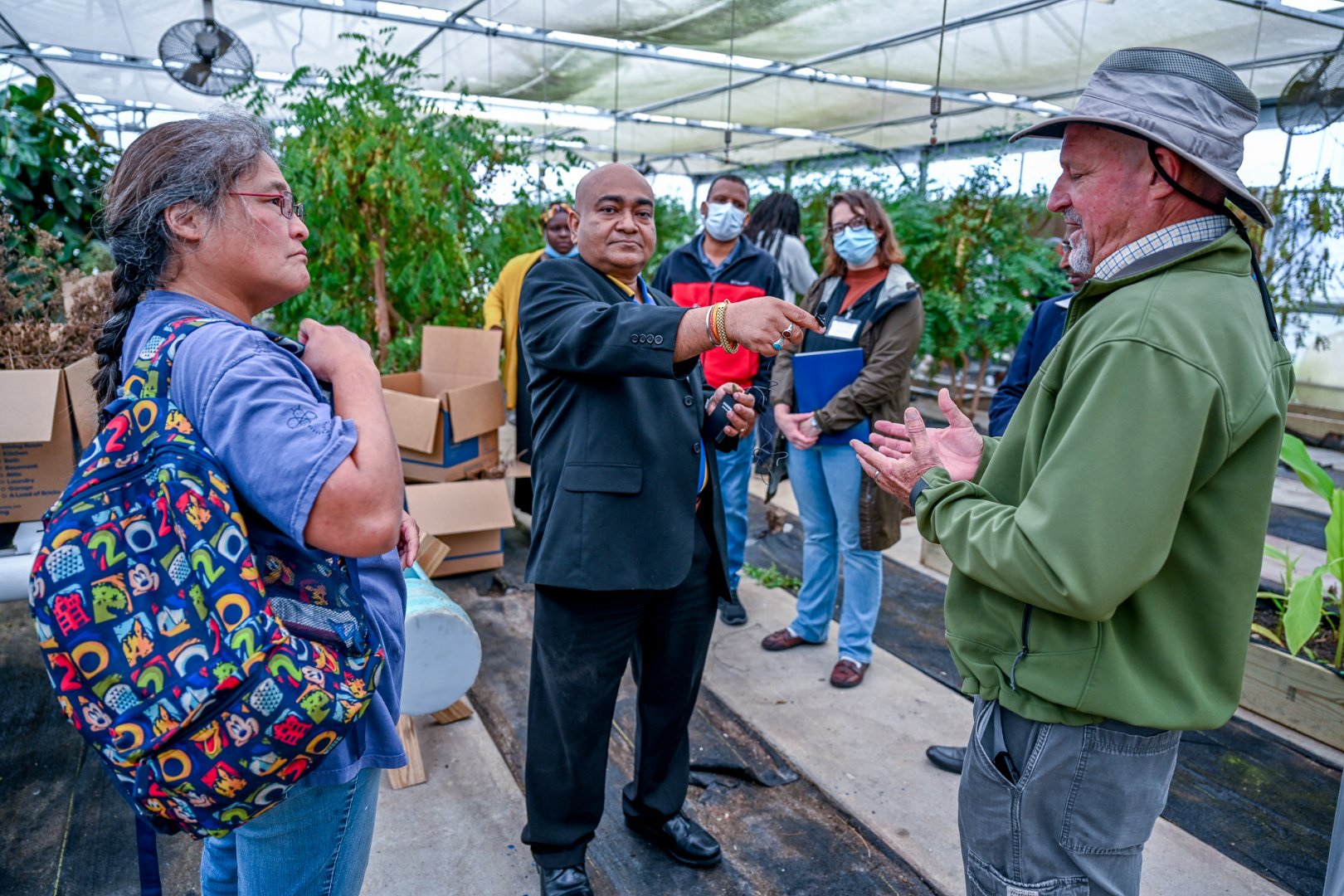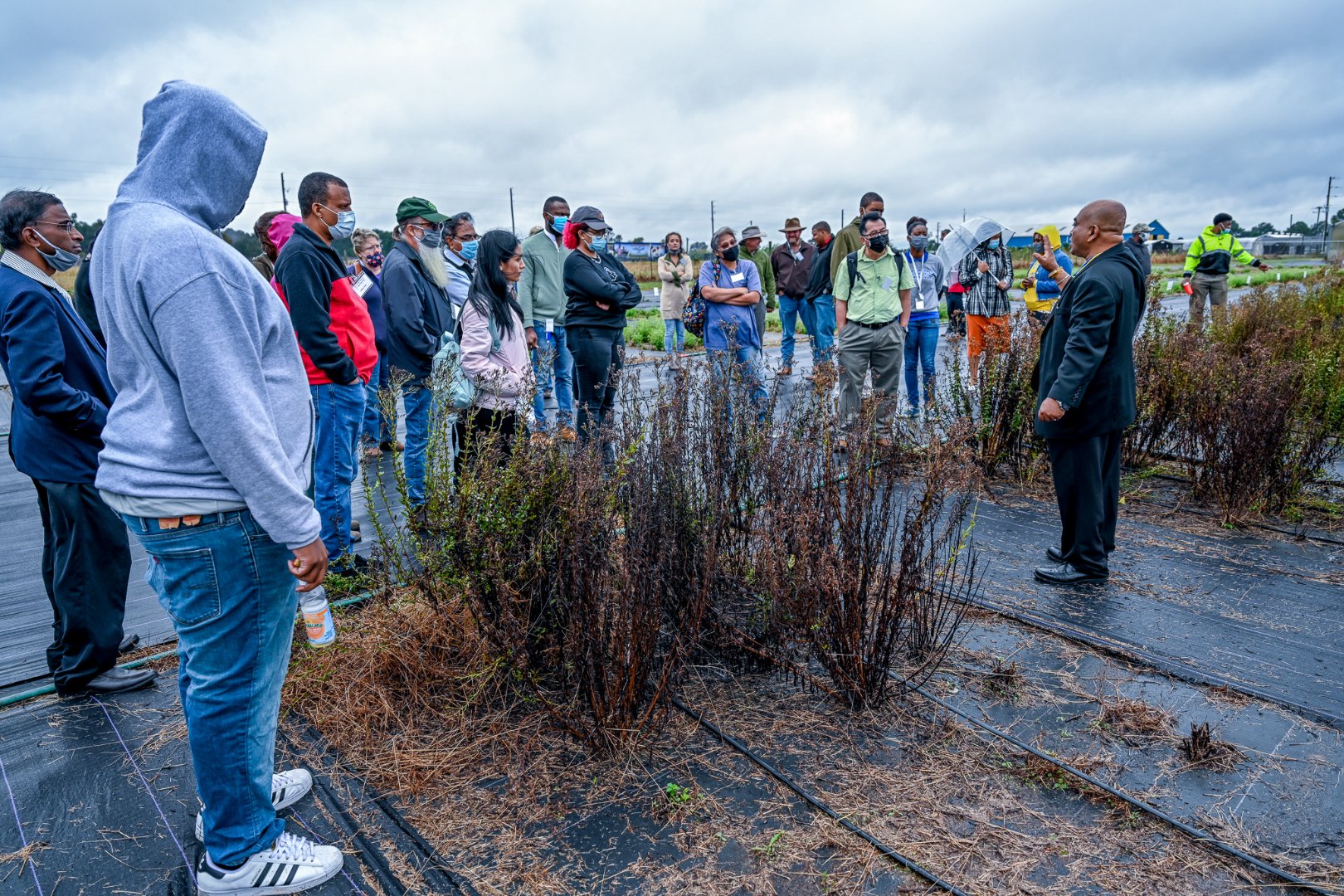Newsroom
Small farmers engage during stevia forum
Posted on Jan 27, 2022

Farmers attend Fort Valley State University’s Stevia Field Day and Annual Meeting to learn more about growing stevia.
A two-day meeting dedicated to assisting producers with growing stevia attracted several farmers, private company representatives and researchers to Fort Valley State University’s Agricultural Technology Conference Center. Also present were students from Georgia, North Carolina, South Carolina, Oklahoma, Florida, and Alabama.
Dr. Bipul Biswas, associate professor of biotechnology, hosted the Stevia Field Day and Annual Meeting to discuss his research aimed at developing best practices for establishing a sustainable stevia industry in the United States. He is collaborating with Alabama A&M University, Auburn University, Michigan State University, North Carolina State University, and the U.S. Department of Agriculture’s (USDA) National Institute of Food and Agriculture (NIFA).
Among the attendees was Dougherty County farmer Alfred Greenlee. As a member of the Southern Farmers Collaborative Group, Greenlee said he attended the workshop to learn best practices for planting stevia acreage and how it can be viable for small farmers. He commended the health benefits of the naturally sweet plant.
According to Greenlee, approximately 22 farmers in middle and south Georgia have joined the Southern Farmers Collaborative Group, initiated in 2018. He said the group collaborates with 1890 Land-Grant Institutions such as FVSU’s Cooperative Extension Program and businesses that can assist them with helping farmers improve their livelihood.
The beef cattle farmer has 15 years of experience and 52 acres of land. This is his fourth year participating in the annual stevia meeting.
“It is very educational,” Greenlee said. He appreciates the work being done to support stevia in the U.S. “This meeting shows the logistics of how it is being done and the makeup of stevia. We must do the research for an overall better product. It could be a great opportunity for small farmers and America because of the health benefits, as well as an asset to the sugar market.”
During the meeting, attendees heard from experts about developing best management practices to optimize stevia biomass and glycoside production in the southeastern U.S. Other topics included evaluating germplasm and developing genetic or genomic resources to enable the selection and breeding of stevia cultivars adapted to U.S. growing conditions and producing consumer-desired steviol glycosides, specifically rebaudioside. In addition, experts discussed the development of consumer profile and market potential analyses for U.S. stevia products and determining consumer-preferred combinations of steviol glycosides.
Dr. Ralph Noble, dean of FVSU’s College of Agriculture, Family Sciences and Technology, also welcomed guests as one of the keynote speakers. He noted the significance of programs that impact health and the value of collaboration.
“Partnerships are important because when we collaborate, we deliver to you,” he told the audience.

Furthermore, attendees toured the campus greenhouse and stevia field plots before Biswas presented his research on growing stevia in various conditions.
“FVSU is the only collaborating institution that is engaged in agronomic research to benefit farmers in the southeastern U.S.,” Biswas noted, mentioning his experience practicing harvesting three times a year and having a few stevia lines that are over wintering for eight years now.
The FVSU researcher is conducting field trials on the specialty crop to evaluate the effect of locations on yield, diseases and weed problems. In 2017, he received $345,406 from a $3,208,657 grant awarded to Michigan State University to study stevia for four years. NIFA funded the project through its Specialty Crop Research Initiative (SCRI) program.
For more information about stevia research, contact Biswas at (478) 825-6827 or biswasb@fvsu.edu.
- Categories:
- FVSU Agriculture College